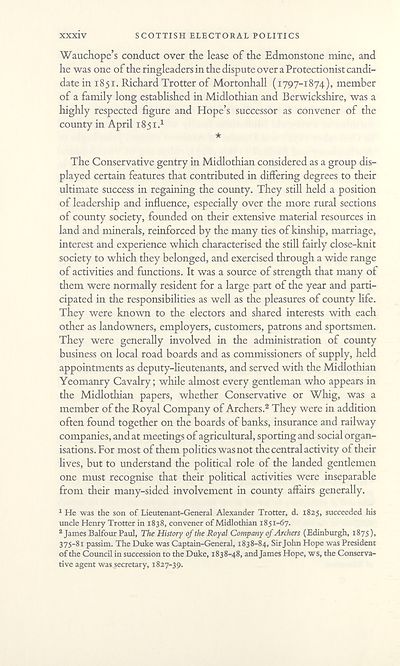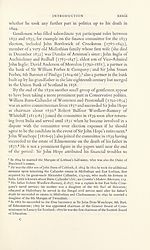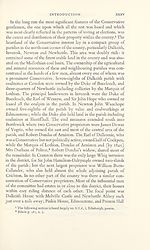Series 4 > Papers on Scottish electoral politics, 1832-1854
(39) Page xxxiv
Download files
Complete book:
Individual page:
Thumbnail gallery: Grid view | List view

XXXIV
SCOTTISH ELECTORAL POLITICS
Wauchope’s conduct over the lease of the Edmonstone mine, and
he was one of the ringleaders in the dispute over a Protectionist candi¬
date in 1851. Richard Trotter of Mortonhall (1797-1874), member
of a family long established in Midlothian and Berwickshire, was a
highly respected figure and Hope’s successor as convener of the
county in April 1851.1
*
The Conservative gentry in Midlothian considered as a group dis¬
played certain features that contributed in differing degrees to their
ultimate success in regaining the county. They still held a position
of leadership and influence, especially over the more rural sections
of county society, founded on their extensive material resources in
land and minerals, reinforced by the many ties of kinship, marriage,
interest and experience which characterised the still fairly close-knit
society to which they belonged, and exercised through a wide range
of activities and functions. It was a source of strength that many of
them were normally resident for a large part of the year and parti¬
cipated in the responsibilities as well as the pleasures of county life.
They were known to the electors and shared interests with each
other as landowners, employers, customers, patrons and sportsmen.
They were generally involved in the administration of county
business on local road boards and as commissioners of supply, held
appointments as deputy-lieutenants, and served with the Midlothian
Yeomanry Cavalry; while almost every gentleman who appears in
the Midlothian papers, whether Conservative or Whig, was a
member of the Royal Company of Archers.2 They were in addition
often found together on the boards of banks, insurance and railway
companies, and at meetings of agricultural, sporting and social organ¬
isations. For most of them politics was not the central activity of their
lives, but to understand the political role of the landed gentlemen
one must recognise that their political activities were inseparable
from their many-sided involvement in county affairs generally.
1 He was the son of Lieutenant-General Alexander Trotter, d. 1825, succeeded his
uncle Henry Trotter in 1838, convener of Midlothian 1851-67.
2 James Balfour Paul, The History of the Royal Company of Archers (Edinburgh, 1875),
375-81 passim. The Duke was Captain-General, 1838-84, Sir John Hope was President
of the Council in succession to the Duke, 1838-48, and James Hope, ws, the Conserva¬
tive agent was secretary, 1827-39.
SCOTTISH ELECTORAL POLITICS
Wauchope’s conduct over the lease of the Edmonstone mine, and
he was one of the ringleaders in the dispute over a Protectionist candi¬
date in 1851. Richard Trotter of Mortonhall (1797-1874), member
of a family long established in Midlothian and Berwickshire, was a
highly respected figure and Hope’s successor as convener of the
county in April 1851.1
*
The Conservative gentry in Midlothian considered as a group dis¬
played certain features that contributed in differing degrees to their
ultimate success in regaining the county. They still held a position
of leadership and influence, especially over the more rural sections
of county society, founded on their extensive material resources in
land and minerals, reinforced by the many ties of kinship, marriage,
interest and experience which characterised the still fairly close-knit
society to which they belonged, and exercised through a wide range
of activities and functions. It was a source of strength that many of
them were normally resident for a large part of the year and parti¬
cipated in the responsibilities as well as the pleasures of county life.
They were known to the electors and shared interests with each
other as landowners, employers, customers, patrons and sportsmen.
They were generally involved in the administration of county
business on local road boards and as commissioners of supply, held
appointments as deputy-lieutenants, and served with the Midlothian
Yeomanry Cavalry; while almost every gentleman who appears in
the Midlothian papers, whether Conservative or Whig, was a
member of the Royal Company of Archers.2 They were in addition
often found together on the boards of banks, insurance and railway
companies, and at meetings of agricultural, sporting and social organ¬
isations. For most of them politics was not the central activity of their
lives, but to understand the political role of the landed gentlemen
one must recognise that their political activities were inseparable
from their many-sided involvement in county affairs generally.
1 He was the son of Lieutenant-General Alexander Trotter, d. 1825, succeeded his
uncle Henry Trotter in 1838, convener of Midlothian 1851-67.
2 James Balfour Paul, The History of the Royal Company of Archers (Edinburgh, 1875),
375-81 passim. The Duke was Captain-General, 1838-84, Sir John Hope was President
of the Council in succession to the Duke, 1838-48, and James Hope, ws, the Conserva¬
tive agent was secretary, 1827-39.
Set display mode to:
![]() Universal Viewer |
Universal Viewer | ![]() Mirador |
Large image | Transcription
Mirador |
Large image | Transcription
Images and transcriptions on this page, including medium image downloads, may be used under the Creative Commons Attribution 4.0 International Licence unless otherwise stated. ![]()
| Scottish History Society volumes > Series 4 > Papers on Scottish electoral politics, 1832-1854 > (39) Page xxxiv |
|---|
| Permanent URL | https://digital.nls.uk/126669507 |
|---|
| Description | Over 180 volumes, published by the Scottish History Society, containing original sources on Scotland's history and people. With a wide range of subjects, the books collectively cover all periods from the 12th to 20th centuries, and reflect changing trends in Scottish history. Sources are accompanied by scholarly interpretation, references and bibliographies. Volumes are usually published annually, and more digitised volumes will be added as they become available. |
|---|


